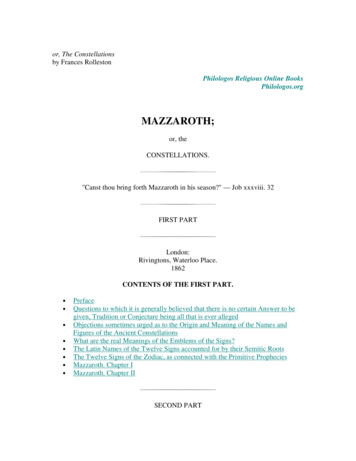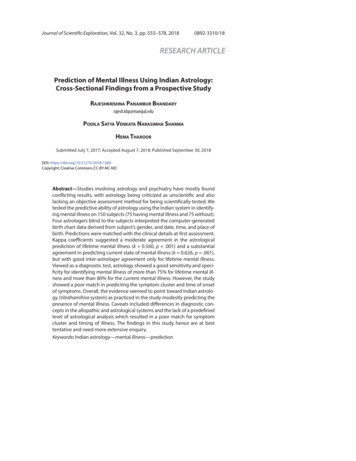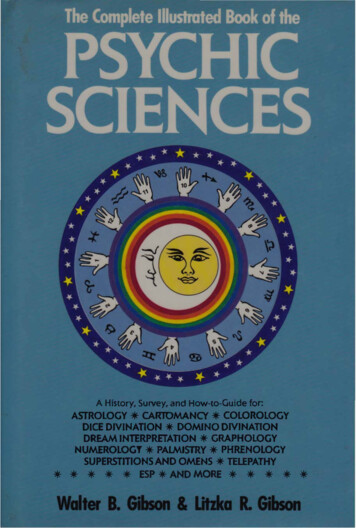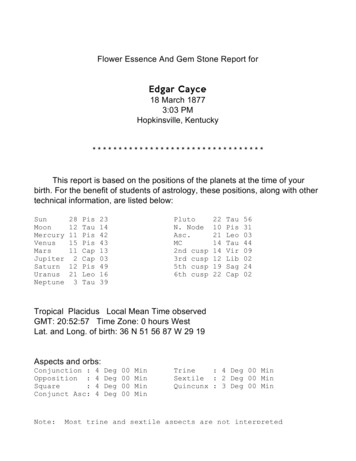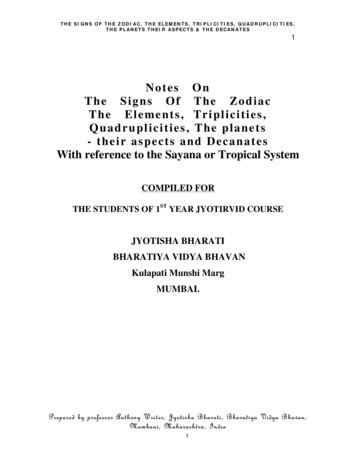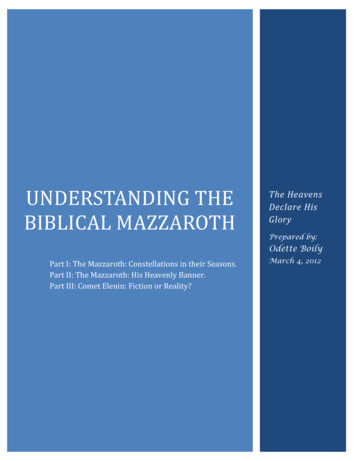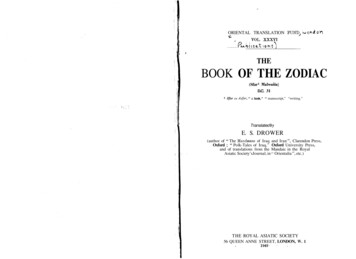
Transcription
ORIENTAL TRANSLATION FUN), k 0 h o! 0 vls.VOL. XXXVIPukiiCnt i o h 5 )THEBOOK OF THE ZODIAC(Sfar Malwagia)D.C. 31Nfar or Asfar, “ a book,”‘‘ manuscript,”“writing.”Translated byE. S. DROWER(author of I‘ The Mandeans of Iraq and Iran ”, Clarendon Press,Oxford ; ‘ I Polk-Tales of Iraq,” Oxford University Press,and of translations from the Mandaic in the RoyalAsiatic Society’sJournal, in “ Orientalia ”, etc.)THE ROYAL ASIATIC SOCIETY56 QUEEN ANNE STREET, LONDON, W. 1I19491I1
JNOTE ON TRANSLITERATION AND PRONUNCIATION.?It has been decided, on grounds'of expense and convenience, touw the English alphabet for purposes of transliteration from Mandaiccharacters. It has been usual to employ Hebrew, but there are objectiom t this, not the least being that Mandaic knows only one h,except b as possessive suffix. Conventions replace letters for whichIthere is no English equivalent, for instance 3 is transliterated '(to differentiate from f-). Purely Mandaic letters or rather words(pronounced kath to rhymecompressed into a sign such asIfTowith English hath) and the particle(pronounced like a d with aglottal stop before it) are iendered kt and ,d respectively. As for thepossessive h it is denoted by a line placed beneath, 4, and thePROFESSOR SIDNEY SMITH,in grateful acknowledgment of wise and friendlycounsel over many yearslike the Arabic3 becomes 3.IiNo indication of pronunciation is given in the case of variableletters such as 3b,4t, and Vp,f, forhhe dain reason that I amunable to give the correct pronunciation in every case, nor is itcertain in these degenerate times that the Mandman priests themselvesknow the original pronunciation. Words in common use such asma&uta (pronounced maswetta), gabra (gcnwa), ganzibra (gawziura organzcnwa), h t a (Wha)'nta('&ha), and the sacramental formula TabPba W a (96gva al %ri)are traditional. In reading and recitationk is often pronounced like the Arabic and 3 g like thev t.theArabictv-2 are pronounced like Arabic4 and L. The A equals Arabic 3 and Hebrew p. The feminineThe heavy lettersplural termination -ata is pronounced G t h , but ata.STEPEEN AUSTTNANXI SONS,LTD., OWENTA& AND I3ENEBAL PIUNTERS, FORE STREET,VERTFORD.'' he came "with a short a, &ha. The termination &a for abstract qualities ispronounced 6th.The accent usually falls on the penultimate syllable.The final a of the plural ending -ia is not pronounced, but r h p e swith English he.
ABBREVIATIONSTABLE“ Taril& Kaldo A&iir ” Mgr. Addi Scher, Beyrouth, 1913.Arabic.h.AsSyrian.Astral. Rep. ‘‘The Reports of the Magiciansand Astrologers of Niniveh and Babylon,”2 vols. R. Campbell Thompson, B.A. (Luzac and Co., London, 1900).B. of T.“Itinerary of R. Benjamin of Tudela, 1165-1173,” translated, withnotes, into Arabic by Ezra H. Haddad (The Eastern Press, Baghdad,A. Sh.Ar.1945). . Aramaic Papyri of the Fifth Century, B.c.” A. Cowley, ClarendonPress, 1923.Dal.“ Aramaisch-NeuhebrLSisches Handwtirterbuchzu Targum, Talmudund Midrasch.” Dr. G. H. Dalman, Frankfurt, 1922.F.A.“Dictionary of the Persian and English Languages.” MauIawi Fazl-i-‘Ali,Bombay, 1885.G.R. (r), G.R. (1). The right side and left side of the Ginza Rabba. resnectivelv.Ibn’ Battjiita’s Travels in Asia and Africa, 1326-1364, transl&d b y .I.B.H. A. R. Gibb. Routledge, Ltd., London, 1939.“ Kitiib Surat-al-Ar? ”Ibn saukal, Lugduni-Batavorum, 1938.I.H.“Kvorum,i bal-Mas6lik1889.wal-Mamglik.” , Ibn Khordiabeh, Lugduni-BataI. Kh.Cowl.Dictionary of the TaSpmim, Talmud Babli and Yerushalmi. and theMidrashic Literature. Marcus Jastrow, Verlag Choreb, Berlin, 1926.Journal of the Royal Asiatic Society.J.R.A.S.“ The Lands of the Eastern Caliphate.”G. Le Strange, CambridgeLe Str.University Press, 1930.“ Aramiiische Planzennamen.” Immanuel L wLeipzig,,1881.Low.“ Mandaeans of ‘Iraq and Iran.”E. S. Drower, Clarendon h s s , Oxford,DIMII.1937.Mac.“Dictionary of the Dialects of Vernacular Spiac.” A. J. Maclean,Oxford University Press, 1901.“ Ma‘jam al-Buldln.”M.B.Ylqiit al-Hamawi, Cairo, 19%.Mont.“ Incantation Texts from Nippur.”J. A. Montgomery, Philadelphia,1913.“ Mandiiiache Grammatik.” Theodor Noldeke, Halle, 1895.N.Persian.P.P.S.Both “ Thesaurus Syriacus ”, by R. Payne Smith, and “ A CompendiouaSyriac Dictionary ”, by J. Payne Smith. Clarendon Press. Oxford.P.S. Supp. Supplement to the same by J. Margoliouth, Clarendon F’reas, 1927.st.“ Persian-English Dictionary.” F. Steingass, Ph.D., Kegan Paul, London,1930.Str.“ The Geography of Strabo in eight volumes.”H. L. Jones, Heinemann,London, 1930.Spr.Syriac.T.W.H.E. Seyyid Taufiq Wahabi (see p. 3).J.VkJ l ’““
PREFACEL&e most of the longer Mandaic manuscripts, the Book of thezodiac is a miscellany, a group of manuscripts of varying source anddate, the main subjects being astrology and omens. At every newyear Mmdaean priests meet together and peruse its pages carefullyin an endeavour to pierce the veils of the near future for themselvesm d the community. In thus doing they carry on traditions of thecowtry, for in ancient Babylon on the eighth and eleventh days ofthe New Year Festival, ceremonies to “ fix the fates ” of the comingyear took place in a part of the Nebo-temple.1 In times of personalor national crisis, too, recourse was had to priest-astrologersand omenreaders, and 80 when during recent years Mandaean priests turnedanxiously the pages of the Book of the Zodiac they were following theexample of those who lived on the same soil thousands of years agoand, in days of stress and war, hoped to 6nd in the stars a promiseof peace and better times.In form, the Sfar Malwdia is a kurasa, that is, a set of unboundpages kept within a pair of stiff covers. The last word of a page isrepeated a t the beginning of the first line of the next. My own manuscriptiwascompleted by the copyist in the year 1247 A.H. A copy ofearlier date, 1212 A.H., in the Biblioth2que Nationale in Paris (libraryreference number C.S. 26) was microphotographed for me ; and lateron, in Baghdad, J was able to make a word-for-word comparison witha third copy dated 1350 A.H., lent me for the purpose by a Mandeanpriest. Reference to these three MSS. is made respectively under“ D.C. 31 ” (my own), “ C.S. 26 ” (the Paris MSS.), and “ A ” (thepriest’scopy). Access to Germanlibrarieswas, unfortunately, impossible.My translation, therefore, is based on three copies. All three havemistakes, miscopyings, and omissions, but they are not of importanceand in most cases it is possible to correct by comparison. Triflingdifferencesare only noted when they may affect sense or construction.The nucleus around which the fragments were originally assembledk, most probably, the k s t segment. It is racy in style and rich inidiom. Nevertheless, Noldeke, in his Ma@ische Grammatik, speaksdisparagingly of the Sfar M d d k ;Hatten wir in diesen Stucken wirklich einen modernen lebendenDialekt, so waren sie von grosser Wichtigkeit ; aber sie bieten unsnur ein unerquickIiches Gemisch von Formen der alten Sprache,welch man noch immer zu schreiben meint, und ganz jungen.Nicht bloss der Wortschatz, sondern auch die Grammatik ist vonmabischen und persischen Elementen durchdrungen. . . . Die* See Myth and Ritual, Chapter HI, “Babylonian Myth and Ritual,” by C. J.Gad4 M A , Oxford University Press, 1933.B
Texte sind dam grade wegen ihren Abweichungen von der altenOrthographie und Grammatik durchweg sehr schwer verstiindlich. ;t,II venture to think that Noldeke is mistaken, and that the languageis not artXcially archaic, but represents a transitional period. In thelater fragments, in which Arabic and Persian elements are, as he says,very evident, we get something very near the spoken Mandaean oftoday, hence, philologically, it is of importance. On other c0unt.athe book is certainly of value and is a rich mine of informationfor the anthropologist and folklorist.In considering the fragments as a whole, it should be borne inmind that most of them are probably, and some admittedly, translations, or, it may be, translations of translations.Arabic, Greek, Persian, and Pahlevi writers probably drew uponolder material. In some passages references to the '' King of kings "and mention of certain place-names indicate a Sasanian epoch, andmuch of the folklore and magic is a heritage from Babylon.Noldeke admits that translation is difficult, which makes apologyconcerning the present attempt uperfluous,although since his time,recently-discovered MSS. have shed a little light on obscurities. Thepath of the translator is made no easier by the purposely contradictoryand ambiguous nature of many expressions and prophecies, a qualitycharacteristic of prophetic utterances from the days of Siwa andDelphi onwards. Oracles must protect their reputation by studiedvagueness ; were they precise, subsequent history and facts mightgive them the lie.Again, copyists re-copy ancient errors, with disaster to the cIarityof the text, a n o t uncommon feature of ancient manuscripts. I makeno apology for my own mistakes, and doubt not that Orientalistsmay find a good deal to criticize and amend. I have oftenbeen in two minds as to the meaning of words, especially 'in thecase,of the roots SKR and gPR. The latter has undoubtedly a doublemeaning in Mandaic, auspicious and inauspicious, as may be -seen byreference to Appendix I, which registers some of the doubtful passagesand expressions.The manuscripts, as said, have been assembled from various sourcesand represent different social conditions and different epochs. Parts Iand I1 give a lively picture of peQple who are frequently well-to-dosince they own slaves and handmaidens, are sometimes landed proprietors or, at any rate, overseers of estates, travel by land andwater, are often red-haired, and are certainly not militant, as thereis no mention of serving in an army. They appear to be peaceful folkunder a foreign governing caste, and might well be Jews, or semiJews under Sasanian or Persian rule. The governing class is spokenof as haricc or malkia. Men are not infrequently employed on-publicworks, or serve in government offices. Women appear to enjoy2person4 freedom and independewe ,and,are certainly pepom ofcharacter.They s p supr&itious and regaTd oeriain people,,as unlucky toothers from birth. . The expression uspd is qiia I . ,., that is ,to say'(dangerous to1 '' others, in much the. same way as the waters of theCat;aract of the. Nile were,called 8'83. in the ,Elephantine Aramaicpapfi.1 This unluckbss can be, mitjigated b j precautioqs taken a tbirth, for instance, they are suckled by two or more wpmen, sometimesby as many as seveq, and ocqasionc lly specified as " a Ipother anddaughter " ; or eke they, are taken cut at birth to the, country ordesert.I,for religion, they are not Moslems or. oythodox Jews as theyworship alahia " gods,"., nor, in ,there anything, t;o indipate that thgy areMandmns. They are " godfearing " and if the'" eye of ,the.,gods " 2is h e d on an individual, he or she enjoys good fortune.In later fragments, VI and VII for instance, the society is evidentlya Moslem community, and the MSS are probably translations fromthe Arabic.In the omen fragments the canvas is wide and includes distantlands. The " king of kings " is warned of great events ; wars, plague,and harvest are dealt with in the manner of Babylonian omen andeclipse texts.3 These and most other predictions in the days of thetrue Chaldean astrology dealt with the fate of nations, kings, andpeoples, not with that of individuals. It was the later astrology ofthe pseudo-" Chaldmns " which converted astrology into an OldMoore's Almanack for the common man and woman.' Babylon andAssyria laid the foundations of astrology, but the Greeks and theirsuccessors raised the superstructure.The book cannot be considered as anything but a number oftranslations, as there is 'no trace whatever of Mandaic ideas, religion,or customs except for references in tags at the conclusion of a section,and these are probably glosses.It remains for me to thank warmly those who have assisted me byadvice and by reading the MSS. or part of them. Amongst these I amespecially indebted to Dr. Hans Polotsky, of the Hebrew University,to Dr. Cyrus Gordon, of John Hopkins University and Smith College,Northampton, Mass., U.S.A., to Professor Neugebauer, and to Professor G. R. Driver for suggestions concerning puzzling passages inthe text. In identifying the place-names in Part 11, I received theefficient help of Seyyid Towfiq Wahbi in Baghdad, of ProfessorII,b1 4,,IAramaic Papyri of tL Fifth Century B.C., by A. Cowley, Clarendon Press, 1923.Or, as the grammatical form is identical, " of god."See 91 49-50, Z'Astrologie Grecque, by A. Bouch6-Leclerque (Leroux,Paris, 1899)see The Astronomy and Astrology of the Babylonians, with Translationsof the Tablets Relating to the Subject ", by A. H. S a p (Transactions of the J Y O C YOf Biblical Archmlogy, iii, 1874).*''3
V. Minorsky of the London School of Oriental Studies, and of others,to whom I tender sincere thanks.For a long time it seemed unlikely that the book could be publisheda t all owing to the lean and difficult times we live in. The Royal AsiaticSociety nevertheless undertook its publication, provided the bulk ofthe money needed was forthcoming from other learned bodies.' TheBritish School of Archaeology in 'Iraq thereupon granted a substantialand generous sum, and Professor E. A. Speiser, of the University ofPennsylvania, most k i d l y guaranteed a certain amount of Ameriosnsupport for the work. To them and to the Royal Asiatic Society I offermy very grateful thanks, not only for their financial help, but for theirconstant encouragement.The figures in square brackets indicate approximately the pageof M a n d m text.ITHE BOOK OF THE ZODIAC[I]In the name of the Great First Sublime Life, from aboundingworlds of light, which are above all works ! Health and purity, strengthand soundness, speech and hearing, joy of heart and a forgiver of sinsbe there for me,' Ram Zihrun son -of Maliha by means of these-theBook of the Signs of the Zodiac for men and women, so that I mayundertake and succeed in it through the strength of Yawar Ziwa andSimat Hiia.* &a.He who is born under the sign of Aries, this is what will becomeof him. He will be tall and handsome and wise, and his mouth andlips will be large, his hair straight, his eyes big and his eyebrows fine.There are two whorls on his head, his nose is long, his voice is powerfuland there is a mark on his face.' He will bring trouble to his fatherand mother : they should suckle him with mixed milk and take himout of the house. If they omit to do this to him the house in whichhe is will be ruined. Good fortune will come to him from noblemen andkings! Heswilldo good to mankind, and get a fair reputation in thecities. He will acquire property, have children, and found a family.He will be a philanthropist (have love towards all [2] humanity).6With a money-bag, Taurus. It is decreed that he will acquireproperty, and he will sit in a seat of honour like sons of noblemen.But all that comes to him from his parents is debarred (or " lost ")to him.? Then he shall become great, he will attain greatness, willacquire land and water, and will plant plantations and build buildings.He will find favour with a widow-woman.With brethren, Gemini. So he will be oppressed by his brethrenand it will warp his disposition? And he will have brothers andsisters-two or three brothers. One of his brothers will fall out withhim. He will dispenae hospitalitya to others, but they will returnhim no thanks (i.e. be ungrateful).loThe copyist.' yawar Ziwa, a spirit of light, and Simat Hiia (Treasure-of-Life),a spirit of life,am commonly invoked in prefaces. The former is a male spirit and the latter a female,and the two together are considered as generating forces.?!b'1. This idioy!tic expression throu m;t the book me;ns " bring ill lucktobring difficulties , " cause trouble to , be hard uponSee Appendix Iand Preface.' Rders to a belief that an unlucky child should be suckled by several women.C.S. 26has emen",etc.(2.8.26 and A have zahmacta l k d 'laif tibuilb.see SKR in Appendix I. In conjunction with the next sentence it may meanhe makes his own fortune unaided by femily cu?nstances.* Literally " his dieposition will bp pervertedGtemllY " will be a giver of food and drink to peoplelo afaa liamqabla Nuts lamqabla, i.e. " are ungrateful "," make no return.''9'4'.".".'
.With parents, Cancer. It is decreed that he will be a mischiefmaker? He will be wealthy and it is written that he will wed an alienwife. Destroy the place in which he was born? if not, it will go hardlywith his parents. He (however) {will stand firm amidst calamity 3and the older he gets, the miter h? will bAnd'3he will havechildren and beget childrendontwo wives.'.(With children, Leo. This will be his destiny-that he will havetrouble with his children, but if he brings them up caxefully and ,takes,precautions,4his children will be reared. He wwill be in gseat pain. ,If[S] Be1 (Jypiter) rulessons will be raised up to him.With pains Fnd blemishes, Virgo. Jt is his fate to pass thoughtrouble '(or" get over sickness "). He will have headache and heartache. They will work spells against him: (he musf guard himselfagainst magic spells. And he will suffer from sore throat and be hurt(scalded) by hot water.With nuptial rejoicings, Libra. It is decreed that he will take awell-born maid to bed 6 and thus he will co-habit with a girl of goodfamily. He is addicted to (Zit. " runs after ") fornication.With death, Scorpio. It is ordained that physical might will behis, or, if %rs is in the ascendant, he will fall into disputes. If Jupiter,Mars, and Sol are in the ascendan , 'a serpent will attack him, or hemay fall from a height and die. If under the aspect of Saturn, he wills d e r from ague and hardship (ill-health?), or bloody marks wiflcome out on him, And he will die a seemly death.Sagittarius is the house of absence 9 from home. It willhappensthat ,he will take a far journey. He will work hard (manual work), andit will turn out well. He will perform good work (Zit. " fair works "),until four or seven years have passed.At the culmination (medium ccalu ),Capricornus ;' so the manwill, be handsome,, impetuop, and brilliant and his sQciety courted., '".ItLiterally " a disturber of peopleRead haha l'mb as in parallel passages, Idiom ; " is born."3 Or, " in sickness will rise in sound health."4 The manuscript is mutilated, but C.S. 26 and A have nirabia uhaJis bniamitqaimilb ' 1 ata %sib sau@ nihuilia. For haJis and hafas see Appendix I.arly Pi, conveys a favourable meaning ; " influences for good "1c c m repeatedly as meaning " having sexual relations withslated it " his lot is " or " his passion goes to 'priests insist8 that p r i a refers to the marriage-couch. ( P u h k ' Ispread on the ground ":) The constmction'Temahs obscure.7 C.S. 26 has wbania d papa nihuilb '' physical weakness (1) will be6 muta iapira occurs often'in*the'MSS. I conjecture tofand with Wl death rites.- ritual. .- auritnr9 Kdizcta (related to the Arabic 3133 '' to,1*homeis use''exile , going abroadd". Phi%ta.I".He will be receivedJ by a [4]great man and will be made much of byand find favour with him. And his enemies will be overcome.With good fortune, full and emptied,a Aquarius. He requites3his enemies with evil and m p e s from the hand of a murderer.( m p t ? the sentence mria in the three q m k . )With poor fortune, Pisces So he will be fond of vainglory, ribaldry,and revelry. Years %batare unlucky for him (Id.are hard upon him)are these : at four years old an illness, and at twelve years an illnessand at forty-two an illnem. If he gets over theae illnesses, he will livesixty-two years or ninety-three years and then dies. &a.Re who is born under T a m , this is his,fate. He will be a powerfulman, and his nostrils 4 wide and large. He is of an active.(or " fiery ")temperament,'of fair complexion, is intractable ti and his eye haughty(Zit. high). He has a taking appearance,@his hair is plentiful and thehair of his head is red.' When lying asleep, slaver coma from hismouth. One side of his head will pain him and there is a whiteness *before his eyes. If (born) at the end (of the Sign) he will be short andbulky 10 and will have, swollen loins and wide feet.'l He will havea [6] defect on one, aide and'&eyes will be small.With a money-bag, full and emptied out,la Gemini. He doesnot (should not) xemain in thexhouse in which he was born, or elsethey should tear it down and relauild &. He will not enjoy (be supportedby) his parents' property, or, if he does get a living, it will be byscheming.18 He will only just scrape a living by plying a craft or bytrade, and that in scant measme,1* and however much he had he wouldnever keep a penny in his purse.With brethren, Cancer. So there will Ire divisions (quarrels) betweenhim and his brothers and'siBters. The children of his father andmother will use him ill.J6 But if his brethren are under similar astrological idluences (Zit. are children of his constellation) he will haveC.S. 26 has mitraurd, not mitqarob.Fate represented here with a horn of plenty which she emptieson the fortunate man ?' C.S. 26 and A have padlun, not p&n, as in D.C. 31.C.S. 26 and A have pumia ptia " his mouth opened ", or " wideC.S. 26 and A quiania.Aramaic TP 3 3 " to delude '* (Zit. " to:teal the eye ")baa a flattering meaningin Mandaic equivalent to " be captivating ", take the eyeC.8. 26 and A have maamuT"bristling", Zit. "sticking up like nails".Cf. Job iv. 16.* guhara, usually " whiteness ", " fairness Here,, possibly, '' a white film " ?* Bdimba missing in D.C. 31.lo MkQtEa (,bulkineas, thicknessKmiiu. This pluralis used vaguely for legs or feet, usually the latter, but".'".".-6.''mmetimes for mms and hands.la See above, note 2. (Here the purse is substituted for the horn, unlees a pursemeant above.)lS Or " by astrology " or " by reckoningl' bmuzania q&qaim or bmuzank grids Irowia. Our idiom corresponds.l5 C.8. 26 has h a w i h , meaning that he d w e a his brothera.".c7,
brothers, ox, if not, he will be an only child and there will be his friendaand his enemies.1With kinsfolk, Leo. If (born) at the beginning (of the Sign) he willbe a liar, casting down his mother before his father and ungratefulto his parents.With children, Virgo. He will have loss 3 in his children, but if thefirst-born of his children is a daughter, it shall be well, and he willhave sons. If the first-born is a son, he will be sickly and will havemarks that come from his mother. If a t the beginning (of the Sign)Taurus is in the ascendant: he will have trouble (OT " loss ") abouthis children caused by wizards and demons. Until he is [S] twenty-eightyears old, (only) daughters will be raised up to him, and he willtake a wife (that will bear him 2) som.With pains and blemishes, Libra. He will fall from a height andwill receive an injury on one side of his head, and water, boiling-over,will sprinkle him. He will obtain release from the king's service(" public works "),? and will escape. He will have pain in the loins,pain in his limbs and legs, swellings (growths 2) on his thighs ; andheadache, and pain in the medrum virile. He will have pain, agues,and terror 8 (caused by 2) the incantations that wizards perform(recite) on him ; and will be wounded by an iron (weapon). But,through the patronage of kings and strangers, they will hold him inhonour, and he will give help to his pe0ple.O The children of his ownflesh and blood, (however) show him no gratitude, and they will fallinto the hands of thieves and fall (into) hot water. If under the (protective) influence of Mars, it is well and he will be saved from all evils.With nuptials, Scorpio. If he takes a stranger to wife, his fate willbe (or " his marriage bed will be occupied by ") three women. He willhave a legal dispute with the first wife and the woman will die amidstthe wrangling lo of his women. He will acquire property either fromthe first or third wife. The woman that separated from him is shortand stocky, her face comely, her eyes small, her limbs long, and herfeet [7] slender, and she has a mark (birthmark 1 ) on her hip. ,The disIi iI'The passage in D.C. 31 is obscure. C.S. 26 has uhawia ahia urahmia bildbabia" and should he have brothers and friends they will become his enemiesThis is probably the correct version.'mb quudam abuh iadia. This idiom occurs constantly. Priests say that it meansthat his mother w i l l die before his father, but this is extremely doubtful. The abovetranslation is tentative.a Bulkna (see Appendix I).D.C. 31 is defective here.C.S. 26 has blah.Lit. " he will take the spouse of sonsThe sentence must be corrupt, andI give the probable meaning.The copyists of the MSS. show wavering. C.S. 26 (fairly reliable) has umn'bkhta d malkio lharuta matk m translated.* lsamdta has the special meaning of " night-fright ", " nightmare A hass a d t a unqi9ia.The sentence is obscure.A has bqrab 'n&&".hawin".'".8tkguiehing marks of another woman are that she is short,.,thickset,-d short-of-limb ; her cheeks are puffy, her face broad, and herprivab parts1 wide. Her head is big and out-of-the-common, herthighs 2 broad and her left 3 side p a h her.With death, Sagittarius. (If) a t the beginning (of the Sign) anamia 4isinherent (2) or comes from (an) outside (cause) (?). When ill,he will recover from his sicknw in two years.,&pricornus issthe,house of absence from home. He will be awayfrom home one year, or three, or seven years. He will be supportedby hisi native place (lit. ea&bread from his native place), and dispenseshospitality, but it is not recipromted. He will have an ungovernabletemper (lit. ";rebellious ", " ungovernable "), raging one hour and thenext calm. When he sets out on a!journey he is timid and turns about,gazing a t ithe road.cAquarius is in the medium coelum. He will pass through 6 eviland. distress, and people are ungrateful to him.But fora number of years well-being 6 will be his and in his old age he willattain to honour.With good fortune, Pisces. He will be brilliant and clever, butofferslno advice to (obher) people. Foreigners will hold him in esteemand he will bet helpful to others, but those of his own flesh and bloodwill show him no.gratitude.Wi&h[8]ill fortune, Aries. Yet out of evil he willattain good. In hisold age he will KFsit cities and frequent amiety.7 There will be an outcry about him, but he will emerge triumphant. He will be violent oftempm. H e will sit at meat with others and will acquire a greatreputation and' become proud.* Crucial (dangerous) years are these :a t two yearstold an illness, at six years old an illness, at eighteen an(illness, at thirty-four an illness,at forty-four an illness, and at fiftyeight an.illness. If he gets over these illnesses he will live to be seventyland then die. L a .This will be the fate of a man born under Gemini. If a t the beginninghe will be under Be1 (Jupiter) and will be tall and alender, his limbsspare, his head small, his! forehead small and his eyes small. Thehair of his head will be red and curly, 'his face long, his body emaciated,his mouth small, his private pa& contracted and his neck long. If(born) in the middle (of the Sign), he will be under the influence ofIkanlcuzia (written elsewhere kanwiu. kanzk) (cf. 733 " to remove from sight ")refers to the sexual parts of either sex throughout the MS.Rig d kraiia. A Mandmn translateil" toesI am convinced this is erroneous," thighs," " upper part of the legs " is more probable.' G'andaito is used in another paasage aa the opposite of yamina " right* The sentence is obscure.C.S. 26 has m M , D.C. 31 mubad. I suspect it should be mabar, i.e. " he comesthrough evil and distress " or " gets over ",e h .6 Or " good thingsLiterally. " will be the companion of men " " be gregarious "D.C. 31 kma rba w i b utarbuta ; but boti C.S. 26 and A have tir& " fatPossibly " nose ",but the usual meaning of wput is " front "," forehead".".".'".".' 9
,Mars. He will be oflsght complexion, the hair of his head red and hisat the endeyes reddened. He willhe ingovernment employ.1 sfiIf,(born)(of the Sign) Sol will be the ruling p h t . He will be [9] short, t h i c k e t ,and fair ; his limbs thin, his gait dsintpand his buttacks 8 (m" ,heele")small. He will.have nerve (musale) (courage ?),,strategy and decision.His eyes will be beautiful and grwnish'(in colour).l He will be a jester.There will be a mark on his breast or on ,his belly. And he ;willcherishrancour in his heart and make mischief (cause &vision*) .amongstpeople, and people dislike him. He will be a star-gazer l(astronomer)and acquainted with the mystery of heavens andand &ut)he sneers {lit. " curls the lip ") at other people.*himin childhood, and his eyes are'hrge. He will do trade by water, willacquire name and fame and will take precedence of others.* Hisfigure will be comely, neither tall nor short ; he is the handsomest ofmen.? He is slender of limb and will be made much of when a child.He will be hasty and quick, choleric of temperament, and does notremain (long) of one mind.*He is employed by the government. And he conceives 4hold on ") evil in his heart (but) it will be well.With a money-bag, Cancer. '.He will acquire property from hisfamily, but all the possessions owned in childhood will pass awayfrom him, and he will gain a living from the property of people ofposition (Zit. he Willie& from hhe property of great people). Yet, thoughhe gelts nothing from his family he will not lack for bread and haveenough to fill his belly (,?it." d l be full "). He likes his associatesand they are fond of him and help [lo] ,him.l0His tongue is like fie, andhe loves jest and song, (in short) he lacks for nothing and will acquirepossessions that were not his own, .and will be made much of by agreat man, and name and fame will be his. Until the age of fifty allthat he po
ORIENTAL TRANSLATION FUN), k 0 h o!0 vl s. VOL. XXXVI _ PukiiCnt ioh5) THE BOOK OF THE ZODIAC (Sfar Malwagia) D.C. 31 Nfar or Asfar, “ a book,” ‘‘ manuscript,” “writing.” Translated by E. S. DROWER (author of I‘ The Mandeans of Iraq and Iran ”, Clarendon



